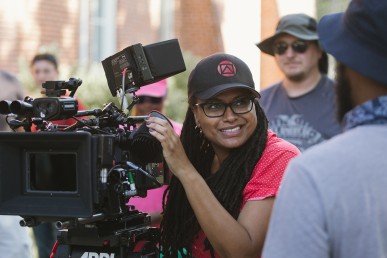UIC film scholars make their picks for Academy Awards

UIC faculty member Sara Hall predicts “Birdman” will win the Oscar. “The academy loves movies about movies, and when they are as smart and tightly wrought as ‘Birdman,’ their chances for a win are very, very good,” she says.
What film will take home the Best Picture award at this Sunday’s 87th Academy Awards?
UIC faculty member Sara Hall predicts the Oscar will go to “Birdman.”
“The academy loves movies about movies, and when they are as smart and tightly wrought as ‘Birdman,’ their chances for a win are very, very good,” said Hall, associate professor of Germanic studies and associate dean in the Honors College.
Other contenders for the award include “Selma,” “American Sniper,” “The Grand Budapest Hotel,” “Whiplash,” “Boyhood,” “The Theory of Everything” and “The Imitation Game.”
All the Best Picture nominees are similar in their immersive experience, depicting an individual’s place in the continuum of time and space, Hall said. “There are common elements to all the Best Picture nominees, which tells us something about what audiences and critics are looking for from movies today,” said Hall, who chairs the undergraduate minor in moving image arts.
Angela Dancey, a lecturer in English who regularly teaches an introductory film course, would like to see “Selma” take the Oscar home. But she’s not enthused about any of the nominees. “They all seem very safe,” Dancey said.
She’s excited about Wei Hu’s “Butter Lamp,” nominated in the Best Live Action Short Film category. “It’s beautiful, funny, moving and political,” she said. “Everything filmmaking should be, in my opinion.”
Of the films Maryanne Lyons has seen, she hopes “Boyhood” or “The Grand Budapest Hotel” wins Best Picture.
“I’m a big fan of both Richard Linklater and Wes Anderson and love just about everything they do,” said Lyons, a lecturer in English who specializes in film and Native American literature. “’Boyhood’ was so touching and so interesting in the level of commitment that went into its making,” Lyons said. “’The Grand Budapest Hotel’ was so funny and quirky and charming.”
All three UIC film experts say they are disappointed that this year’s Best Picture nominees reflect what Dancey called “a very male and very white point-of-view.”
“There’s nothing wrong with men’s stories, but women make up half the population,” she said.

“Selma” director and executive producer Ava DuVernay was overlooked in Oscar nominations, UIC film scholars agree.
Lyons mentioned “Wild” and “Selma” as strong work by women that was overlooked.
“It would be a sign of progress if the academy pushed against the gender imbalance in the film industry, rather than reflecting and reproducing it,” Hall agreed.
Jennifer Reeder, a filmmaker and associate professor of moving image, blames the “Hollywood machine” for the lack of diversity. It’s a process, she speculated, that works on favors among producers.
“I think that leading up to the academy voting, it’s a real machine on some level, and one that doesn’t necessarily include a group of really open-minded, thoughtful people,” Reeder said.
She also believes that American culture doesn’t favor artistic films.
“It’s not so much that the American audience can’t handle indie films or art films — they absolutely can, they just don’t know it,” Reeder said.
Reeder hasn’t seen many of the nominated films, but she wishes Ana Lily Amirpour’s “A Girl Walks Home Alone at Night” — the tale of a teenage female Persian vampire — would receive a Best Picture nod.
“It would be cool if a year from now, we’ll be talking about that film getting a nomination, and all of a sudden, a sort-of-average teenage girl will have a choice between the eighth ‘Twilight’ film, or a film about a teen-skateboarding-vampire from Iran,” Reeder said. “I think that would be pretty cool.”

